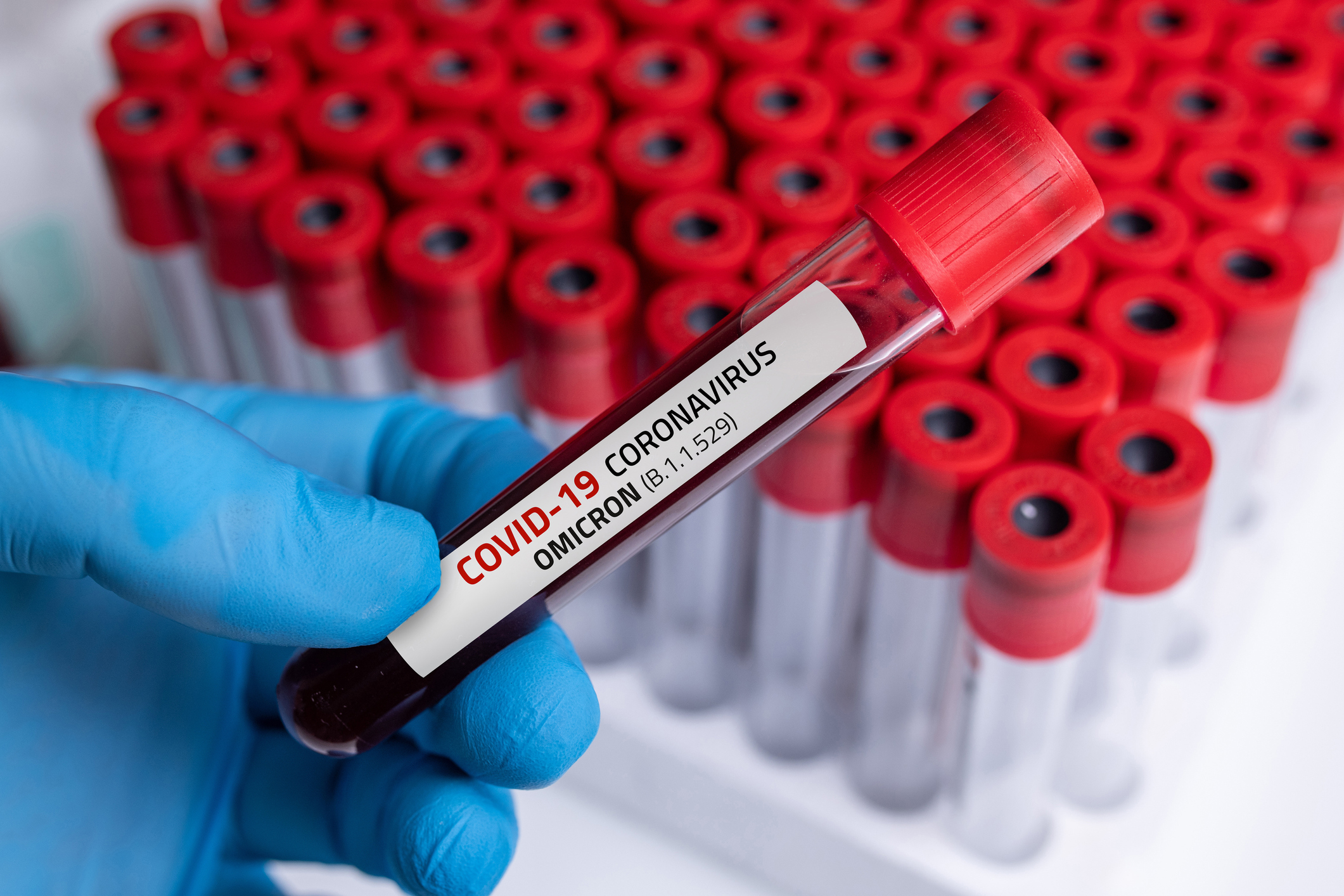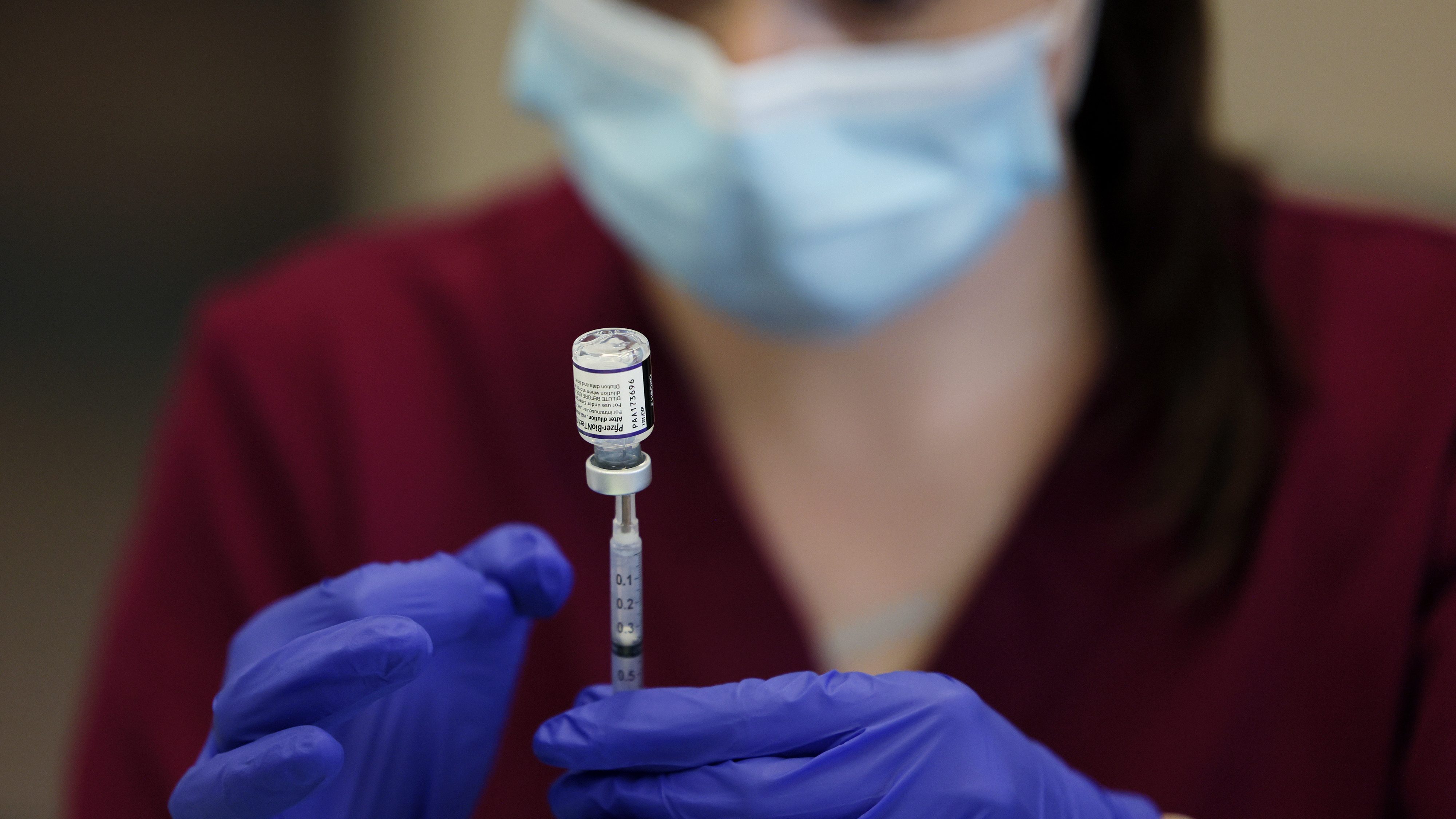Gov. Charlie Baker announced Tuesday he is activating up to 500 members of the National Guard to assist hospitals with the COVID-19 surge and updating the state's mask advisory.
The state Department of Public Health released an updated mask advisory Tuesday urging all individuals, regardless of vaccination status, to wear a mask or face covering in indoor public spaces.
They said this is especially important for those with a weakened immune system or with an underlying medical condition, or if someone in their household has a weakened immune system, is at increased risk for severe disease or is unvaccinated.
Asked why he wasn't implementing a mask mandate instead of just an advisory, Baker said he doesn't think that step is necessary given how much of the state's population is fully vaccinated.
"I have no interest in putting a mandate on this given all the tools available on a statewide basis for the people of Massachusetts," he said. "If locals wish to pursue those options they can do so. We issued a mask mandate last fall because we had no other options available to us... If people wish to add an extra layer of protection by wearing a mask in indoor settings, we would urge them to do so, especially when we have cases rising across the Commonwealth."
The latest advisory from Baker is not helping resolve the mask debate. There are people who agree it was the right move. Others feel it was an overreach. And some don't think it went far enough.
"We’re a little disappointed that the governor’s recommendation doesn’t go quite that far but we’re moving in the right direction,” said Dr. Carole Allen, of the Massachusetts Medical Society, which has been recommending a mask mandate.
The state’s advisory will have less of an impact in Greater Boston where more than 40 cities and town already have indoor mandates. The Metropolitan Area Planning Council is still hoping for a statewide mask requirement to make things less confusing.
"I understand the Governor’s philosophy is to give municipalities control over their local affairs and I appreciate that. But people don’t stay put in one municipality or the other, they move around.” said Marc Draisen, with MAPC. "We feel we should have a mask mandate statewide. We should also have a statewide requirement to show vaccination card if you're entering public venues."
Some lawmakers agree that the mask advisory is simply not enough.
Congresswoman Ayanna Pressley and Sen. Ed Markey both posted on Twitter, calling on Baker to reinstate the indoor mask mandate.
"With COVID surging across MA, we must take every measure necessary to protect our communities," Pressley said in a tweet. "I'm calling on @MassGovernor to reinstate an indoor mask *mandate* & implement other bold policies to keep our communities safe & healthy."
"Lives are at stake & we must be aggressive," Pressley added.
But Baker said Tuesday that while they think more people should be masking, Massachusetts residents know at this point that masking is one of the tools they can pursue if they choose to do so.
Braintree Mayor Charles Kokoros says things seem to be working without mandates from the state for masks, or vaccinations.
"We're following the science. We have reached goals that would allow us to not have those mandates,” Kokoros said.
Baker also announced he is activating up to 500 National Guard members to help with the non-clinical support needs of hospitals and transport systems.
Up to 300 of them will begin training this week and will support 55 hospitals and 12 ambulance service providers across the state.
Guard personnel will be deployed beginning next Monday.
It's welcome news for health care systems like UMass Memorial Health, which said in a statement Monday, "We think these are excellent steps that Governor Baker is taking to keep our communities safe. I know he is trying to consider all options to keep our economy going while protecting us from this virus."
"Activating the National Guard is extremely important – we could actually use the extra help today," added UMass Memorial Health President and CEO Eric Dickson, MD. "We have requested 63 National Guardsmen to support all of our hospitals here in Central Massachusetts."
The National Guard has stepped up before during the pandemic: helping man mass vaccination sites, and driving school vans.
"The Department of Public Health certainly has an ask list but we also have limited resources so we try to determine and prioritize what the highest needs are and we will provide whatever we can to help fulfill the mission," said Lt. Col. Pat Donnelly, with the Massachusetts National Guard.
This time that means transporting patients both inside and outside hospitals, providing security and delivering food to take that burden off medical professionals who are under tremendous pressure.
"We are absolutely in a crisis situation. Our healthcare workers have been on the front lines of what is something some of us have never seen in our lifetime. These folks have worked tirelessly to something that seemingly is just not going away," said Lisa O'Connor, a former chief nursing officer at Boston Medical Center. "The National Guard providing non-medical support should be helpful in making sure there are enough arms and legs around those healthcare providers so they can do the work that only they can do."
Hospitals across the state are critically close to or even exceeding capacity due to staffing shortages, an uptick in COVID-19 cases and an increase in the number of people needing in-patient care.
Earlier this month, Baker ordered hospitals dealing with “critical” staffing shortages and an influx of patients to cut elective services and procedures by 50%. Certain non-essential, elective services and procedures were already reduced by 30% last month. He has also said he is exploring the possibility of activating the National Guard to help out in hospitals.
Col. Donnelly acknowledged this isn't an easy task for soldiers.
"It is a hard time for soldiers, as well," he said. "We're pulling them up during the holiday season to provide assistance and support through, potentially, the next 90 days."
As part of Tuesday's announcement, the Department of Public Health also released updated guidance to hospitals concerning nonessential, elective procedures. Effective at 12:01 a.m. on Monday, Dec. 27, all hospitals are directed to postpone or cancel all nonessential elective procedures likely to result in inpatient admission in order to maintain and increase hospital bed capacity.
"There's no question the next few weeks will be enormously difficult for our healthcare community," Baker said. "The steps we're announcing today are designed to support them so they can continue to care for patients."
The governor's new plan comes as the omicron variant becomes the dominant version of the coronavirus in Massachusetts and across the U.S.
Researchers at the Broad Institute estimate that the highly mutated variant has been dominant in Massachusetts since Dec. 17, less than two weeks after it was first detected in a fully vaccinated woman in Middlesex County.
From NBC10 Boston's Weekly Doctor Panel
A panel of Boston-based doctors talking about everything related to the COVID-19 pandemic
Just over a week ago, the mutation made up less than 2% of new cases in Massachusetts. Within one week, it shot up to 38%. Nationally, omicron accounted for 73% of new infections last week, nearly a six-fold increase in omicron's share of U.S. infections in just seven days.
Massachusetts health officials reported another 5,531 confirmed coronavirus cases and 58 new deaths Tuesday.
Massachusetts' seven-day average of positive tests rose from 5.91% Monday to 6.45% Tuesday, the highest it's been since Jan. 14, as the winter surge was receding. The metric was once above 30%, but had dropped under 0.5% until the delta variant began surging in the state.
The number of patients in Massachusetts hospitals with confirmed COVID-19 cases rose by nearly 100 to 1,612, the most since Feb. 3. The figure was once nearly 4,000, but reached under an average of 85 at one point in July. Of those currently hospitalized, 467 are fully vaccinated, 368 are in intensive care units and 203 are intubated.



